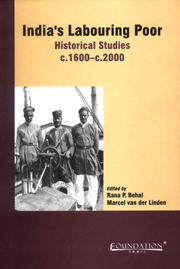Book contents
- Frontmatter
- Contents
- Notes on Contributors
- Frontispiece
- Preface
- Introduction
- Working Across the Seas: Indian Maritime Labourers in India, Britain, and in Between, 1600–1857
- The Brickmakers' Strikes on the Ganges Canal in 1848–1849
- On the Move: Circulating Labour in Pre-Colonial, Colonial, and Post-Colonial India
- Mobility and Containment: The Voyages of South Asian Seamen, c. 1900–1960
- Power Structure, Discipline and Labour in Assam Tea Plantations during Colonial Rule
- “Following Custom”? Representations of Community among Indian Immigrant Labour in the West Indies, 1880–1920
- Masculinity, Respect, and the Tragic: Themes of Proletarian Humor in Contemporary Industrial Delhi
- Stretching Labour Historiography: Pointers from South Asia
- DOCUMENT
- Select Bibliography
“Following Custom”? Representations of Community among Indian Immigrant Labour in the West Indies, 1880–1920
Published online by Cambridge University Press: 05 January 2012
- Frontmatter
- Contents
- Notes on Contributors
- Frontispiece
- Preface
- Introduction
- Working Across the Seas: Indian Maritime Labourers in India, Britain, and in Between, 1600–1857
- The Brickmakers' Strikes on the Ganges Canal in 1848–1849
- On the Move: Circulating Labour in Pre-Colonial, Colonial, and Post-Colonial India
- Mobility and Containment: The Voyages of South Asian Seamen, c. 1900–1960
- Power Structure, Discipline and Labour in Assam Tea Plantations during Colonial Rule
- “Following Custom”? Representations of Community among Indian Immigrant Labour in the West Indies, 1880–1920
- Masculinity, Respect, and the Tragic: Themes of Proletarian Humor in Contemporary Industrial Delhi
- Stretching Labour Historiography: Pointers from South Asia
- DOCUMENT
- Select Bibliography
Summary
On 25 June 1887, a curious incident was reported in the San Fernando Gazette of Trinidad in the British West Indies. At the end of the month of Ramadan that year, on the great festival day of Eid ul-Fitr, the Indian Muslims of Victoria village and of nearby estates congregated for the mass prayer in the Little Masjid. A fracas began unexpectedly when several Muslims objected to facing east in the direction of Mecca for the prayer. They argued instead that they should face west as they were wont to do in India. Theological debates soon gave way to a free exchange of blows between the votaries of eastward and westward prayer. Peace was restored after a considerable period, but with appeals to the eminent lawyers, Messrs Wharton and Farfan, to mediate in the dispute. Was the dispute simply due to ignorance as to the true direction of Mecca? Or was it a case of “following custom”, the much maligned traits that the Indian Muslims shared with their compatriots?
This incident, a small footnote in the longer history of community formation, is significant for another reason – indicative as it was of the travails of travel. Migration always meant transformation of lives and styles and involved living with changes that one neither chose nor anticipated. Cultures had to be created; they could not simply be transplanted. The incident interests me because it provides a striking illustration of two competing and divergent theoretical formulations about the larger question of community and ethnic identity formation among Indian migrant labourers and their descendents in the British Caribbean colonies.
- Type
- Chapter
- Information
- India's Labouring PoorHistorical Studies, 1600-2000, pp. 173 - 202Publisher: Foundation BooksPrint publication year: 2007
- 1
- Cited by



